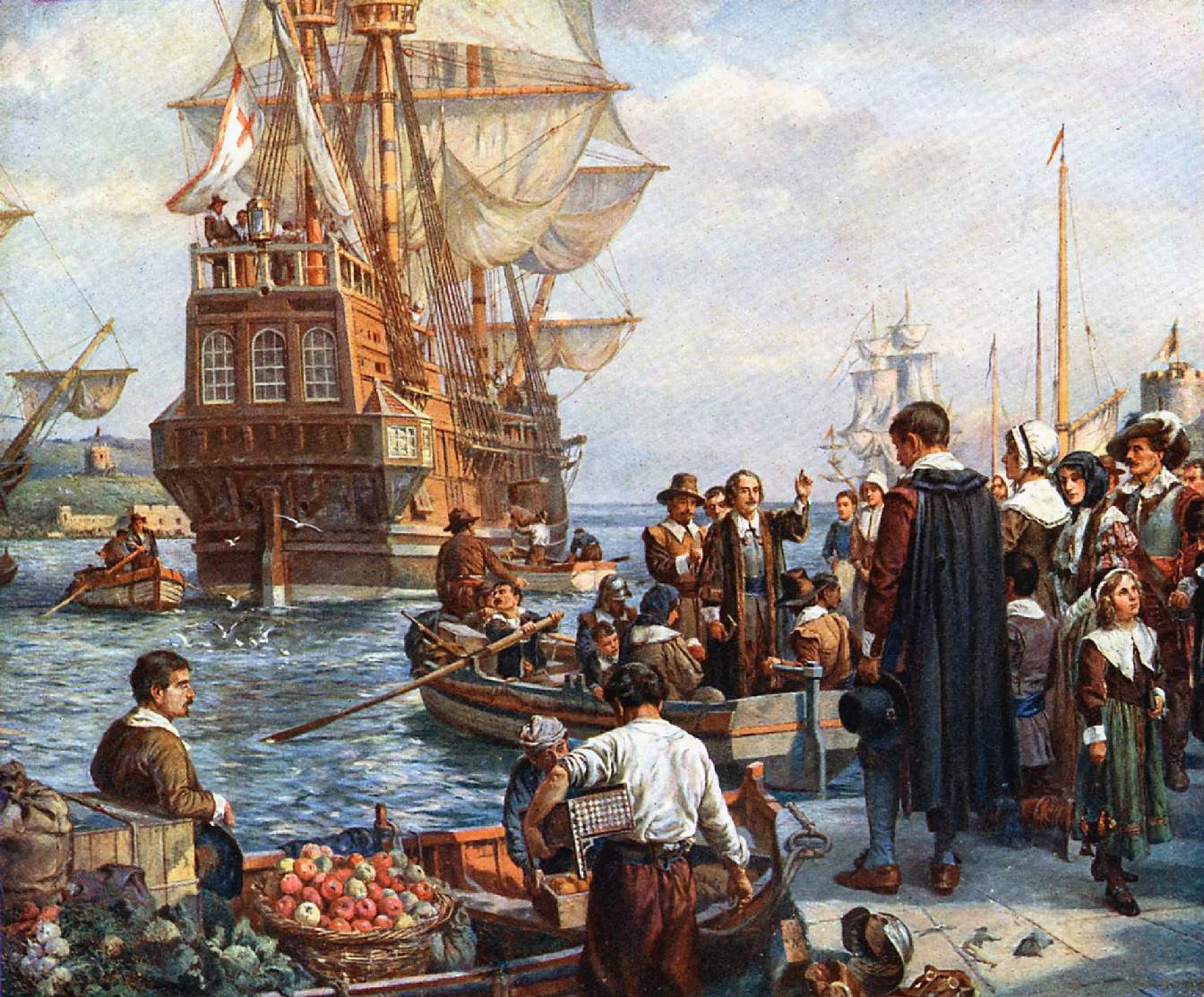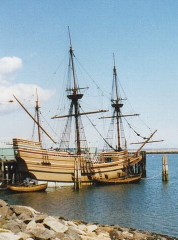|

Mayflower
painting under sail from Devon, Plymouth - heading for Massachusetts,
USA
Contemporary
accounts of the Mayflower
voyage:
There is only one primary source account in existence
that describes events that occurred while the Mayflower
was at sea. It was written by William Bradford, in
his History of Plymouth Plantation. His account of the
voyage, in its entirety, follows:
September 6. These troubles being blown over, and now
all being compact together in one ship, they put to sea
again with a prosperous wind, which continued divers
days together, which was some encouragement unto them;
yet according to the usual manner many were afflicted
with sea sickness. And I may not omit here a special
work of God's providence.
There was a proud and very profane young man, one of the
sea-men, of a lusty, able body, which made him the more
haughty; he would always be condemning the poor people
in their sickness, and cursing them daily with grievous
execrations, and did not let to tell them, that he hoped
to help to cast half of them overboard before they came
to their journey's end, and to make merry with what they
had; and if he were by any gently reproved, he would
curse and swear most bitterly. But it pleased God before
they came half seas over, to smite this young man with a
grievous disease, of which he died in a desperate
manner, and so was himself the first that was thrown
overboard. Thus his curses light on his own head; and it
was an astonishment to all his fellows, for they noted
it to be the just hand of God upon him.
After they had enjoyed fair winds and weather for a
season, they were encountered many times with cross
winds, and met with many fierce storms, with which the
ship was shroudly shaken, and her upper works made very
leaky; and one of the main beams in the mid ships was
bowed and cracked, which put them in some fear that the
ship could not be able to perform the voyage. So some of
the chief of the company, perceiving the mariners to
fear the sufficiency of the ship, as appeared by their
mutterings, they entered into serious consultation with
the master and other officers of the ship, to consider
in time of the danger; and rather to return then to cast
themselves into a desperate and inevitable peril.
And truly there was great distraction and difference of
opinion among the mariners themselves; fain would they
do what could be done for their wages sake, (being now
half the seas over,) and on the other hand they were
loath to hazard their lives too desperately. But in
examining of all opinions, the master and others
affirmed they knew the ship to be strong and firm under
water; and for the buckling of the main beam, there was
a great iron screw the passengers brought out of
Holland, which would raise the beam into his place; the
which being done, the carpenter and master affirmed that
with a post put under it, set firm in the lower deck,
and other-ways bound, he would make it sufficient.
And as for the decks and upper works they would caulk
them as well as they could, and though with the working
of the ship they would not long keep staunch, yet there
would otherwise be no great danger, if they did not
overpress her with sails. So they committed themselves
to the will of God, and resolved to proceed. In sundry
of these storms the winds were so fierce, and the seas
so high, as they could not bear a knot of sail, but were
forced to hull, for divers days together. And in one of
them, as they thus lay at hull, in a mighty storm, a
lusty young man (called John Howland) coming upon some
occasion above the gratings, was, with a seele of the
ship thrown into the sea; but it pleased God that he
caught hold of the topsail halyards, which hung
overboard, and ran out at length; yet he held his hold
(though he was sundry fathoms under water) till he was
hauled up by the same rope to the brim of the water, and
then with a boat hook and other means got into the ship
again, and his life saved; and though he was something
ill with it, yet he lived many years after, and became a
profitable member both in church and commonwealth.
In all this voyage their died but one of the passengers,
which was William Butten, a youth, servant to Samuel
Fuller, when they drew near the coast. But to omit other
things, (that I may be brief,) after long beating at sea
they fell with that land which is called Cape Cod; the
which being made and certainly known to be it, they were
not a little joyful. After some deliberation had amongst
themselves and with the master of the ship, they tacked
about and resolved to stand for the southward (the wind
and weather being fair) to find some place about
Hudson's River for their habitation. But after they had
sailed that course about half a day, they fell amongst
dangerous shoals and roaring breakers, and they were so
far entangled therewith as they conceived themselves in
great danger; and the wind shrinking upon them withal,
they resolved to bear up again for the Cape, and thought
themselves happy to get out of those dangers before
night overtook them, as by God's providence they did.
And the next day they got into the Cape-harbor where
they rid in safety. A word or two by the way of this
cape; it was thus first named by Captain Gosnold and his
company, Anno. 1602, and after by Captain Smith was
called Cape James; but it retains the former name
amongst seamen. Also that point which first showed these
dangerous shoals unto them, they called Point Care, and
Tucker's Terror; but the French and Dutch to this day
call it Malabar, by reason of those perilous shoals, and
the losses they have suffered there.
Being
thus arrived in a good harbor and brought safe to land,
they fell upon their knees and blessed the God of
heaven, who had brought them over the vast and furious
ocean, and delivered them from all the perils and
miseries thereof, again to set their feet on the firm
and stable earth, their proper element. And no marvel if
they were thus joyful, seeing wise Seneca was so
affected with sailing a few miles on the coast of his
own Italy; as he affirmed, that he had rather remain
twenty years on his way by land, then pass by sea to any
place in a short time; so tedious and dreadful was the
same unto him.
Only
one other contemporary account of the Mayflower's
voyage exists, and though it was not written by a Mayflower
passenger, it was written in 1624 by Captain John Smith
(the same one rescued by Pocahontas), based on second
hand information he had heard, or read in letters sent
back to England. What Smith wrote follows (the
spelling has not been modernized in this passage):
Upon these inducements some few well disposed Gentlemen
and Merchants of London and other places provided two
ships, the one of 160 Tunnes [the Mayflower], the
other of 70 [the Speedwell]; they left the coast
of England the 23 of August, with about 120 persons: but
the next day the lesser ship sprung a leake, that forced
their return to Plymouths [England]: where discharging
her and 20 passengers, with the great ship and a hundred
persons besides sailers, they set saile againe the sixt
of September, and the ninth of November fell with Cape
James [Cape Cod]; but being pestered nine weeks in this
leaking unwholesome ship, lying wet in their cabbins,
most of them grew very weak, and weary of the sea.

ACIDIFICATION
- ADRIATIC
- ARCTIC
- ATLANTIC
- BALTIC
- BERING
- CARIBBEAN
- CORAL
- EAST
CHINA
ENGLISH
CH - GOC
- GULF
MEXICO - INDIAN
- MEDITERRANEAN
- NORTH
SEA - PACIFIC
- PERSIAN
GULF - SEA
JAPAN
STH
CHINA - PLASTIC
- PLANKTON
- PLASTIC
OCEANS - SEA
LEVEL RISE - UNEP
MARITIME HISTORY
GENERAL HISTORY
|

